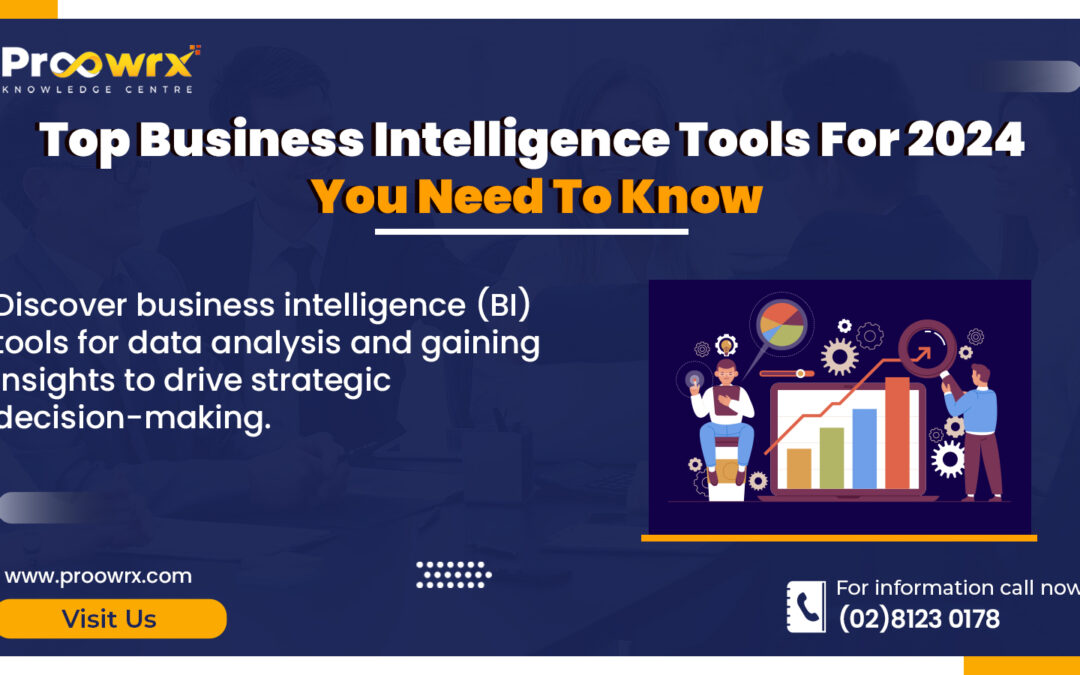In almost every industry, business intelligence (BI) is a critical success factor. There has never been a more important time to be able to draw insightful conclusions from data, and BI technologies enable this.
Businesses are becoming more and more conscious of the need to utilise big data as its prevalence rises. They need to organise and analyse their data well since they have access to so much information. The use of business intelligence technologies has increased in tandem with the availability and complexity of data.
The sheer number of BI tools that are accessible may be both liberating and debilitating. This post presents and describes some of the top business intelligence products on the market today, with a focus on how beginner-friendly they are, to assist you in navigating this terrain.
Before we jump on the Best BI Tools, it will be good to understand what is business intelligence tool.
What Are Business Intelligence Tools?
The broad range of software, platforms, and solutions known as business intelligence (BI) tools are intended to extract, convert, and present data to facilitate data analysis, trend detection, and strategic decision-making in an enterprise. With the help of these technologies, you can turn unstructured data into insightful knowledge that will help you make better decisions, run your business more efficiently, and maintain your competitive edge in the data-driven marketplaces of today.
Even if it seems fantastic, you might be curious about how BI tools can accomplish all of this. By going over the four fundamental functions of BI tools, we may respond to this:
- Data Integration: Databases, spreadsheets, and cloud-based apps are just a few of the sources of data that BI tools may connect to and combine.
- Data Transformation: This feature of BI tools is essential for enhancing the interoperability and usefulness of the data because it might be in a variety of forms. By organising, combining, and cleansing data, users may alter it.
- Data Visualisation: Business intelligence relies heavily on its ability to graphically portray huge and frequently complicated datasets to provide insights and highlight patterns and trends.
- Reporting: With a BI tool, the data is finally presented as a report or dashboard that may be instantly distributed to important stakeholders.
Why are Business Tools Important For Your Business?
The issue of how and why you should care is raised by the crucial role these technologies play in maximising the potential of data and fostering success.
Let’s run over some of the ways that BI tools can benefit your business.
- Single source of truth: A single source of truth is created when data from several sources can be combined, providing a centralised, all-encompassing perspective of the organization’s activities.
- Trend Analysis: BI technologies let you see patterns and trends in data by visualising both historical and present data. This helps you better understand consumer behaviour, market dynamics, and the effects of corporate strategy.
- Data-Driven Decision: One of the main benefits of BI tools is the capacity to make choices based on data. These technologies enable firms to reduce risks, find growth possibilities, and optimise processes without depending solely on intuition by offering actionable information.
- Efficiency and Productivity: BI solutions lessen the amount of manual data management by providing automated reporting and data visualisation. Employee productivity is increased by this efficiency, which also frees them up to concentrate on key duties.
- Issue Resolution: BI tools can identify possible problems or organisational bottlenecks. Businesses can take corrective action to enhance performance and procedures by identifying areas of issue.
When businesses combine business intelligence with data science, it may reach its fullest potential. Reports on important business indicators can be automatically generated and distributed by analysts using computer languages such as Python, R, or SQL.
Top Business Intelligence Tools
Microsoft Power BI
A robust BI solution, Power BI provides a free desktop programme in addition to a cloud-based platform for sharing dashboards and reports. Power BI is a feature-rich application that can both convert and visualise data. It also has some amazing AI-based features and predictive modelling capabilities that set it apart as a market leader in business intelligence.
There are two ways to pay for Power BI: either a Pro subscription that is paid for each user, or a Premium plan that is charged for each person or capacity if you need access to sophisticated enterprise-scale capabilities.
Key Features:
- Integrations and data connections for a variety of data sources.
- A drag-and-drop report builder and robust data visualisation features combined with an intuitive UI.
- Natural language enquiry for investigating data.
- Web-based nature Power BI reports are readily shared with others by publishing them online. Furthermore, Power BI Service on the web allows for the direct construction of reports along with direct application interaction.
Additionally, Power BI can interact with Python, allowing you to include data science capabilities right into your Power BI reports.
Tableau
Another well-known BI application that prioritises accessibility is Tableau, especially for non-technical users. Tableau offers sophisticated data search and visualisation tools, as well as pre-built data connectors that make it simple to interact with hundreds of applications.
Tableau is a cost-effective choice, even for small teams, thanks to its three-tiered subscription-based pricing model.
Key Features:
- Many data connections are available for practically all types of data sources.
- Users may create and automate interactive, dynamic dashboards or quickly create ad hoc assessments of their data.
- Live data visualisation and analysis are made possible by real-time data integration.
Looker Studio
Looker Studio is a free tool for building interactive reports and dashboards that can be customised and integrated with several data sources. There is also an option to subscribe to the Looker Studio Pro plan.
Looker Studio, which prioritises speed and simplicity, enables even total novices to tap into the potential of Google’s ecosystem to generate reports and data visualisations that make data easily comprehensible and accessible.
Key Features:
- Google Sheets, Analytics, and other Google services are directly integrated.
- Real-time collaborative report creator with drag-and-drop functionality.
- Reports are easily embedded and shared.
Domo
Domo is a fully cloud-based business intelligence tool with user-friendly reporting and data visualisation features. Domo’s pre-built connections, user-friendly and straightforward UI, and easiest-to-use ETL solution among all BI tools make it an excellent choice for novices.
To explore the tool and learn more about it, Domo provides a limited-time free edition. Afterwards, they provide three price categories based on your needs. Instead of basing its pricing on users, Domo bases it on credits. You can have as many users as you like, but if your use runs out of credits, you’ll need to buy more.
Key Features:
- More than a thousand pre-built connections for different data sources.
- Advanced embedded analytics to have “Domo Everywhere”.
- Magic ETL simplifies data transformation and cleaning even for those without a lot of technical knowledge.
Zoho Analytics
Because Zoho Analytics is a very economical and user-friendly business intelligence solution, it is particularly appealing to small enterprises and novices. To keep expenses down, Zoho Analytics does not, however, sacrifice capability. Like the other BI tools on our list, you can anticipate a good number of the same outstanding capabilities for data preparation and visualisation.
Based on the quantity of data you wish to import into the platform and the number of users you have, Zoho Analytics provides four price categories. With the option for dedicated servers, Zoho Analytics may offer you a more specialised plan if your company handles a lot of data or has a high number of users.
Key Features:
- Self-service data preparation and administration are provided by Zoho DataPrep.
- Prefabricated widgets and dashboards.
- Direct connections to more than 50 well-known data apps and integration with more than 250 data sources.
- With “Ask Zia,” a natural language query tool, customers may ask questions in plain English about their data and get visualised responses in return.
Sisense
Because of its distinctive data architecture, which integrates data preparation, data modelling, and data visualisation into a single, unified platform, Sisense is renowned for its potent and very quick data analysis capabilities. Beginners shouldn’t be put off by the platform’s strength and sophistication, either, since Sisense has made significant efforts to create a no-code user interface with a top-notch drag-and-drop dashboard builder.
Sisense provides cloud-based and self-hosted pricing options based on your requirements.
Key Features:
- Single-stack design for analysis and data preparation.
- The in-chip data engine of Sisense is built for fast data processing and can easily handle big datasets.
- A user-friendly drag-and-drop dashboard builder that is more widely available.
- Integration of AI and machine learning to enable higher analytical capabilities.
Conclusion
In conclusion, selecting the appropriate business intelligence technology is essential to the data-driven success of your company. These technologies enable well-informed decision-making, simplify trend analysis, and aggregate data. Try out a few of the tools we covered in this post, then pick the one that best suits your organization’s size and budget while also supporting your business goals.
To know more about the tools we use at Proowrx, Book A Discovery Call Today.

